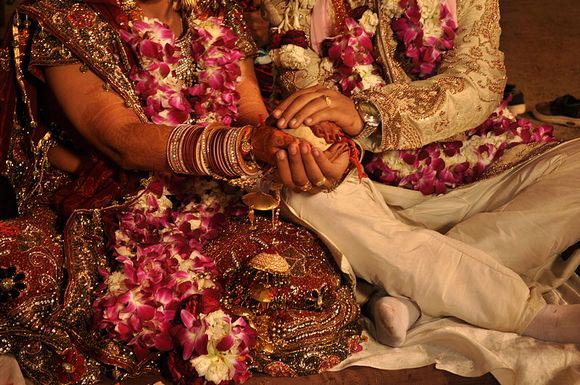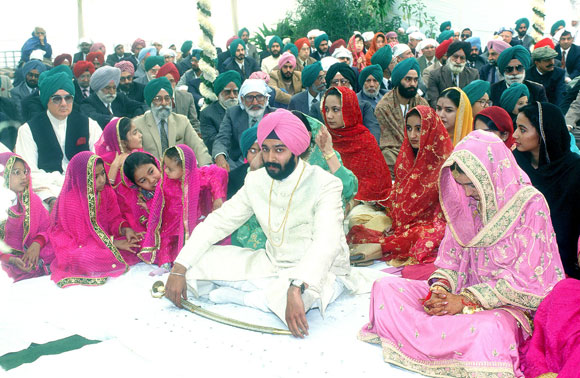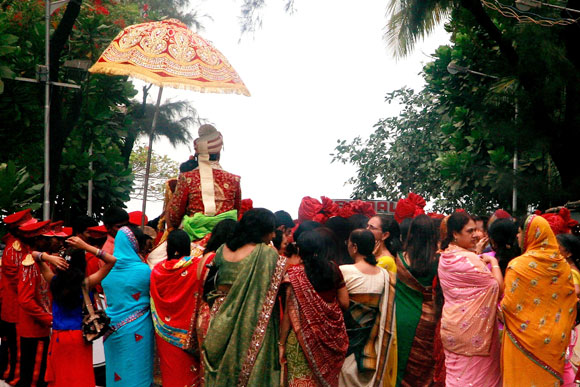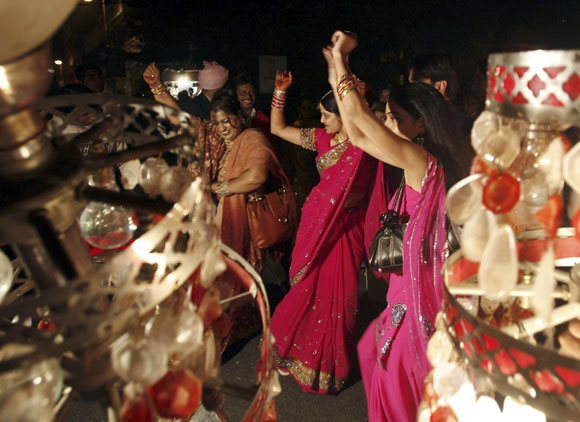 | « Back to article | Print this article |
Here's why young Indian couples want to stay in joint families!
According to a Shaadi.com survey, more young Indians are looking to get married into joint families. We find out why young couples would give up their personal space to live with the in-laws.
Every evening, Simi Tripathi returns home from work, opens her refrigerator and sighs. Mostly, the refrigerator is empty. The few raw vegetables that have been bought a week ago, stare at her listlessly, killing whatever little desire there is left in her to cook a meal.
Sometimes, she goes ahead and tosses up something half-heartedly or alternatively, tells her husband, Prashant Kumar to have his dinner at work or on his way back and she orders in.
Then she goes off to sleep, wakes up the next morning and the rigmarole starts all over again.
Should something go wrong in the house or either of them falls ill, their schedule goes for a toss.
The story of Tripathi (27), an IT engineer working in Hyderabad and Kumar (29), also a software professional isn't an isolated case. The Double Income No Kids (DINK) couple that works for ten hours each day and returns to an empty home is now more common than one may want to believe.
For an outsider, they may seem like a couple with enough money to spare and the freedom to do what they wish yet they know where the shoe bites the most.
"It does get lonely sometimes," Tipathi confesses, "especially when you're ill."
Even though the two are dying to have kids, Tripathi says it wouldn't be the most pragmatic decision to make. With both their sets of parents living in two different cities, she says having kids is unimaginable.
"How do we raise them? We're out for most parts of the day. By the time we return home we barely have time for each other. Even if there was a creche that would take care of them for that long, it'd be cruel to leave a child there for 12 hours every day."
For many young couples such as this one, the prospect of living by themselves is a scary one and raising children is out of question.
Would YOU give up your freedom and personal space to live in a joint family? Share your views.Post your opinions HERE!
Here's why young Indian couples want to stay in joint families
It isn't surprising that a recent survey conducted by Shaadi.com reveals that more young Indians are opting for a joint family set up.
According to the survey, 54 per cent of female and 53 per cent of male respondents were keen on living in a joint family.
Only 21 per cent women and 14 per cent men wanted to live independently after marriage.
The trend isn't new. According to an India Today AC Nielson-ORG-MARG survey conducted back in 2006, 84 per cent respondents said they'd prefer to live in a joint family.Gaurav Rakshit, business head of Shaadi.com says that the trend is interlinked with more young women wanting to pursue their careers even after marriage.
According to the survey, 89 per cent of women were keen on continuing with their jobs even after marriage and 85 per cent of men said that they would like their wives to pursue their careers post-marriage.
"In such a case, the joint family and parents are a big part of the need," Rakshit says.
The trend of marrying a career woman, Rakshit adds, had begun around 2009 when the country was going through an economic downturn.
"That was a watershed year. Our survey that year showed more men were looking for a working spouse. Since then the numbers have only gone up. Also a lot of couples think it is prudent to save money. So, a joint family provides a viable alternative," he says.
Here's why young Indian couples want to stay in joint families
Take the case of Devika Mehta, a lecturer at a business management school who has an 18 month-old son and lives with her parents-in-law. Mehta is out of the house for at least 8-9 hours each day and that's where her in-laws step in to take care of her son.
While she does admit that it's great to have her in-laws around -- the food is taken care of sometimes and she can't stop listing the advantages of seeing her son grow with his grandparents around --she wouldn't think of living in a nuclear family ever.
Mehta says she always wanted to get married into a joint family and being born in a big (though not joint) family with close-knit relatives it is the only way of life she's known.
Her colleague, Yashashree Kokate who also lives in a joint family also says she loves her in-laws and loves being with them and like Mehta can list out many reasons why it's a great thing to live with them.
Yet in the middle of our conversation, she does let slip that she'd probably stay there only till such a time that she and her husband can afford a house.
However, she adds that if it happens, she'd probably try and ensure they buy an apartment closer to her parents' or her in-law's place.
Prajakta Shetye, a chartered accountant by profession and her husband Vinit Deo who were working in Mumbai before they got married chose to shift their base and move to Pune where their parents live.
However living with the parents was never an option. They had both lived away from their parents for long enough to move back with them.
Also the idea of shifting to a city like Pune was to be able to have a slightly more relaxed lifestyle so they would have the time to spend with each other.
So they bought an apartment that was accessible to both the sets of parents.
Months into their marriage and their respective new jobs, Deo fell very ill. "By then we had used up all our leaves. Vinit's long spell of illness meant he was already on unpaid leave. I couldn't have taken leave to take care of Vinit."
That's when their families came handy. As Deo recovered from the illness, Shetye kept the house running and ensuring the EMIs were paid.
"It would have been impossible to manage without our parents," Shetye tells me.
Then, when it was time to have a baby, the grandparents were happy to play babysitters and the couple was happy to drop her off at their home.
To ensure that her mother isn't stressed, Shetye has hired a domestic help to help her assist in the task.
Without her parents, Shetye says, she wouldn't have been able to even dream of having a career.
Here's why young Indian couples want to stay in joint families
Shetye and Deo now have two daughters. I asked her how high her parents' presence was in the list of reasons when they were planning the second child.
"It would rank as number one," she tells me unhesitatingly. "We wouldn't have even thought of having a second child had it not been for my parents."
This however doesn't necessarily mean the return of the one big happy family.
According to psychologist Sadia Rawal, the desire to live in a joint family stems from a somewhat need or compulsion.
"If you leave young couples to themselves, most of them would rather stay independently," she says, "However things change when kids come into the picture. Usually both the sets of parents are working and when they have children they prefer to have the grandparents take care of them rather than leave them at a day care."
"The other reason why couples would choose to live with their parents is if (the parents) are unwell or one of them has passed away. Living in a joint family is usually more because of a sense of a duty or compulsion rather than a sense of real willingness."
Prakrit Arora couldn't agree more. For almost a decade, Arora studied and worked in the US before deciding it was time to return to his motherland.
Arora comes from a well-to-do Delhi family and was quite ok getting married to the girl his parents chose for him.
While he had just about settled in a job in Delhi and was staying at his parents' home while still looking at prospective matches, an incident triggered off alarm bells.
On returning home one evening, his father, having opened up his credit card statement was fuming at the money he'd spent on a one-off night out with his friends at a five star hotel bar.
That evening, he heard out his father as he ranted about his 'extravagant spending habits'. He didn't offer any defence but by then he'd made up his mind -- there was no way he would stay in the same house as his parents.
So he managed to convince his superior to transfer him to their Mumbai office, got married and took the first flight out of the city.
When he'd met his wife-to-be, he made sure she knew of his plans. The move wasn't acrimonious and no one from the family knows the real reason for his shifting cities.
They both work and are happily living in a comfortable apartment in Mumbai. While they don't have kids yet, he is certain he won't move back to Delhi even if they do.
This however is easier said that done. Another set of young parents I spoke to tell me that the option of raising a child without any filial assistance isn't very simple.
"It is a full-time occupation," the husband who didn't want to be named told me.
After a spat with his family, the two moved out and with no room for reconciliation were finding it impossible to raise their newborn till finally she quit her job and became a stay-at-home mom.
It isn't an entirely unpleasant situation as she takes up freelance assignments from home.
Eventually, they plan to move to her hometown so they can be close to her family.
Would they stay with them? I ask.
"Certainly not," he replies laughing but adds that they'd probably live close to their apartment but not in it.
In a way then the concept of a joint family itself is evolving.
The traditional joint family with half a dozen nuclear families and tens of children living in one big ancestral house gave way to the urban joint family with just the grandparents, one set of parents and their children living in a tiny city apartment.
Today, perhaps this form is undergoing a change too. With young couples wanting their space and yet finding themselves being unable to entirely cut themselves away from their parents are opting to stay closer to them so each is available when the other needs them and the kids are taken care of.
As yet another workday draws to a close I find myself wondering how our parents managed to raise us without making it look like it was some Herculean task. Sure some of us had our grandparents who looked after us. But I suspect there were as many who didn't.
How, for instance did our parents manage our daily routine, our illnesses, the PTAs and keep their day jobs? It is a mystery that few from our generation seem keen to solve.
And so as the city evolves and the financial demands keeps young couples at work for longer and longer hours, the responsibility of raising the next generation has fallen on the very generation that has raised us.
Would YOU give up your freedom and personal space to live in a joint family? Share your views.Post your opinions HERE!



